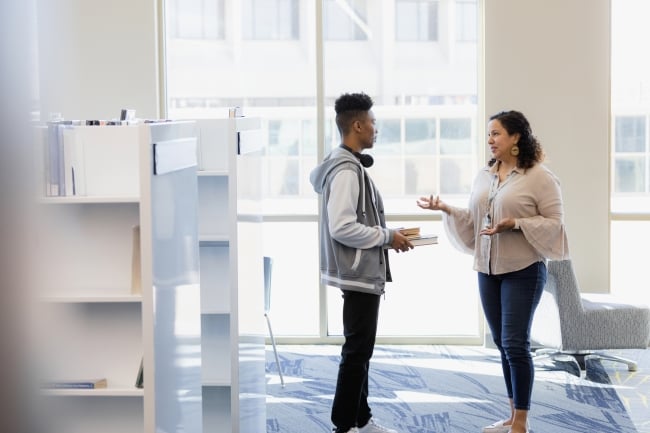You have /5 articles left.
Sign up for a free account or log in.

Professors can take simple steps to improve their approachability, which could boost student success in the classroom.
SDI Productions/E+/Getty Images
Creating successful student engagement can start with a professor fostering a welcoming attitude within themselves and their classrooms.
The Faculty Approachability Project seeks to equip higher education professionals with ideas to break down barriers to access in classrooms and improve relationships between faculty members and learners.
Creating change: Chris Morett was working as an administrator at Rutgers University when he got the idea to promote faculty approachability. One math professor was known on campus for being engaging and an active learning enthusiast, trying new course technology and tools to interact with students. Morett wanted to model that kind of instructor.
“I thought, he’s just the ideal of the approachable professor on the strength of his personality, his concern, his affect. [But] not everybody is John. How do you get that approachability?” explains Morett, now an independent higher education consultant.
Approachability for a faculty member, he adds, is the idea that a student can interact with the individual and that the professor is a part of their community.
Within his work, Morett hopes to identify ways that approachability and student engagement can be scalable and sustainable, not draining additional time and resources from already-overworked professors.
Student Engagement May Boost Academic Outcomes
A 2023 Student Voice survey from Inside Higher Ed and College Pulse found students believe additional or intentional professor engagement would contribute to their academic success.
Of students surveyed, 34 percent said they’d benefit academically from professors taking more of an interest in getting to know them, and 22 percent said they’d benefit from professors being more accessible outside of class hours.
In his work, Morett has found faculty approachability creates positive outcomes in students as an information source as well, creating better, richer feedback.
What’s the need: Often, higher education incentivizes individualistic behaviors from professors, like solo authorship, making student connection less of a priority for some faculty members.
Women and faculty of color are also more likely to be the approached professor, which adds disproportionate amounts of invisible labor to their workload, Morett says.
With growing mental health concerns among students, professors are also worried they do not have the right resources to support heavier conversations.
Engagement tips: The Faculty Approachability Project launched in January 2023 and offers a tool kit of actionable items, a LinkedIn community and live webinars.
Some of the tips found in the Faculty Approachability Project toolbox include:
- Demystify yourself. To be more approachable, faculty members must first identify where they feel unapproachable. Small behaviors like smiling, showing up early to class, making small talk or revealing life details and doubts can display a professor’s humanity and take them off an academic pedestal.
- Build capacity. For professors to provide the best care, they also need to have adequate capacity in their work and personal lives. Establishing baseline functions like a reference sheet of resources or an automated scheduler can create more space in a professor’s life for intentional connection.
- Use space well. Understanding how a professor’s office space looks and feels for a student can promote or detract from their overall approachability. Meeting students in their own spaces like the library or the student union can make a professor more visible and accessible, as well.
- Triage care. Professors can play a powerful role in connecting students to other institutional resources and campus services. Triaging can also create healthy boundaries for professors to not overextend themselves within their role.
The engagement project’s webinars launched March 29 and are taking place every two weeks to address one of three themes: the benefit of faculty approachability, capacity-building tactics and faculty member training and support.
In the future, Morett hopes to implement workshops for institutions to create interpersonal relationships between professors within the institution, and to break down silos in communication and ideas.
Seeking stories from campus leaders, faculty members and staff for our Student Success focus. Share here.




